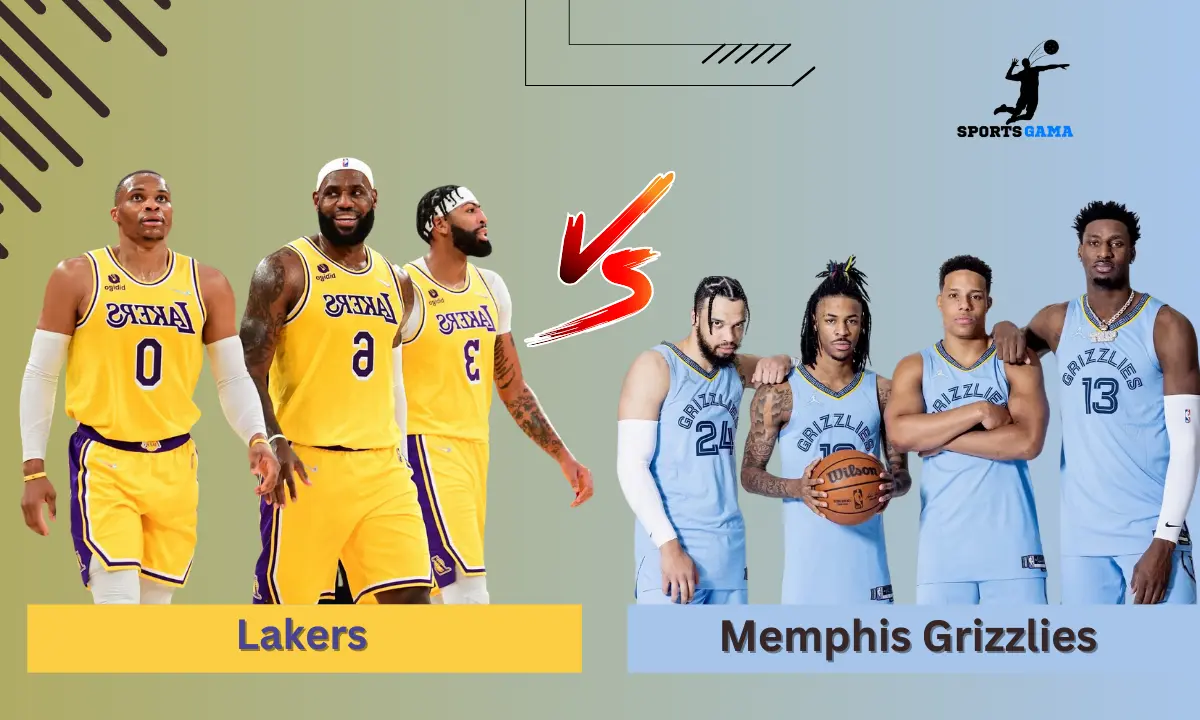Memphis Grizzlies vs Lakers match player stats: The Memphis Grizzlies and the Los Angeles Lakers rank as two of the more popular franchises in the NBA, featuring an extremely avid fan base with a lot of history between the two. Any time that these two teams face off against one another, a highly entertaining contest is always expected from them. We look at some of the player stats of their last confrontations, going in-depth into individual performances, key matchups, and how these numbers reflect the bigger dynamic of the game.
Teams Overview
There is first a need to understand where these two teams’ rosters and playing styles have come from.
Memphis Grizzlies: The Grizzlies were known to be a grit-and-grind team. But with time, though, they really evolved into a team that showcases just a bit more speed and rhythm. With its emerging core of talent, Memphis depends on its kids and older guys to stay competitive with the best.
Los Angeles Lakers: The Lakers are one of the more successful franchises in NBA history, and they have been one of the strong teams every year. Boasting superstars and veterans on their roster, the Lakers are indeed deep with the kind of fire power for offense and defense.
Key Matchup: Ja Morant vs. LeBron James
One of the more exciting aspects in any Grizzlies vs. Lakers matchups is how both Ja Morant and LeBron James have always managed to match up head-to-head with one another. Both highly respected leaders for their respective teams, much of the success does seem to go through them.
Memphis Grizzlies Ja Morant: Not many have been as exciting this season, as the young point guard brought his high-octane performances into the last matchup against the Lakers. He had a well-rounded set of skills in that action-packed event, chalking up 28 points, 11 assists, 7 rebounds, 2 steals, and 50% field goal percentage, 35% three-point percentage.
With great vision on the court and the ability to penetrate the defense, he at all times was a threat. Another strength of his playmaking well complemented his scoring since he was extremely effective in involving teammates in the action, which made Grizzlies’ offense less predictable.
LeBron James (Los Angeles Lakers): Some call him The King, and boy is he fighting Father Time in every regard. Here is LeBron’s line in the Memphis matchup:
- Points: 32
- Assists: 9
- Rebounds: 8
- Blocks: 1
- Field Goal Percentage: 54%
- Three-Point Percentage: 40%
LeBron’s scoring was really instrumental in keeping the Lakers competitive. Other than dictating the game tempo, his on-court leadership factor made all the difference. LeBron added another layer to that reputation with his defensive contributions, including his ability to guard multiple positions.
Supporting Cast
While the stars often are the headliners, basketball is a team sport, and supporting casts often play an important role in tipping the balance of any game either way. So let’s see what came from key role players for both teams.
Memphis Grizzlies:
Desmond Bane, shooting guard, was known on both ends of the court:
- Points: 24
- Rebounds: 6
- Assists: 4
- Steals: 3
- Three-Point Percentage: 42%
Bane’s shooting ability stretched the Lakers’ defense, and his perimeter defense was key in limiting the Lakers’ outside shooting.
Jaren Jackson Jr.: The three-and-D big provided:
- Points: 18
- Rebounds: 10
- Blocks: 3
- Field Goal Percentage: 47%
Jackson was incredibly impactful on both sides of the court. The shot-blocking presence ultimately kept the Lakers out of the paint, as his scoring gave the Grizzlies an inside-out threat.
Los Angeles Lakers:
Anthony Davis: He was a force for the Lakers. He had:
- Points: 26
- Rebounds: 12
- Blocks: 4
- Field Goal Percentage: 52%
Davis was controlling the boards and vital to rim protection. He continued to find ways to be a valued contributor inside and out from the floor and filled a major role in the Lakers’ offense.
Austin Reaves: T His most storied output came with 15 points on 38% 3-point shooting along with five assists and four rebounds.
Reaves’ knack for making big shots given the time and situation gave the Lakers backcourt depth as a secondary playmaker.
Bench Contributions
In close games, one can usually find that a bench is the difference-maker. Here’s how both teams’ benches fared in tonight’s matchup:
Memphis Grizzlies Bench:
Tyus Jones: The back-up point guard was good for some quality minutes:
- Points: 10
- Assists: 6
- Turnovers: 1
Jones’ steadying hand at running the offense allowed Morant to take much-needed rest without the offense falling into a funk.
Brandon Clarke: The forward chipped in with:
- Points: 8
- Rebounds: 7
- Field Goal Percentage: 55%
Clarke’s energy off the bench was infectious as his capabilities to crash the boards made for second-chance opportunities for the Grizzlies.
Los Angeles Lakers Bench:
D’Angelo Russell: The former All-Star came off the bench to add:
- Points: 12
- Assists: 4
- Three-Point Percentage: 36%
Russell’s scoring punch off the bench was important, especially when the starters of the Lakers needed rest.
Rui Hachimura: The forward played a key role with:
- Points: 9
- Rebounds: 5
- Field Goal Percentage: 48%
The fact that Hachimura can guard across positions and offer something offensively, too made him one of the biggest assets coming off the bench.
Defensive Impact
A lot of close games are won on the basis of defense. There are players that have a chance to turn this series for both teams on their defensive side of the floor.
- Memphis Grizzlies: Jaren Jackson Jr. anchored the Grizzlies’ defense with a team-high 3 blocks, as his ability to change shots and protect the rim was huge in limiting interior scoring to the Lakers. Alongside him, Desmond Bane paced the Grizzlies in steals with 3 that underlined the high level of perimeter defense that made the Lakers find open looks from beyond the arc.
- Los Angeles Lakers: AD was the anchor in L.A.’s defense, with 4 blocks and numerous affected shots at the rim. He made sure Memphis didn’t continuously attack the rim. LeBron James – His versatility allowed him also to guard multiple positions, most importantly provide invaluable help when needed.
Key Takeaways
- Star Power: Ja Morant vs. LeBron James was hyped, and both had great performances in the matchup. Morant’s playmaking and scoring were super crucial in this one for the Grizzlies, and LeBron’s all-around game kept the Lakers in contention.
- Supporting Cast: Players like Desmond Bane, Jaren Jackson Jr., Anthony Davis, and Austin Reaves provided the big glue that came into play in the dynamics of the game. How they rose in the big moments underlined depth on both rosters.
- Bench Play: The benches were very important for both teams in keeping the intensity of this game. Tyus Jones and Brandon Clarke gave the Grizzlies stability, while D’Angelo Russell and Rui Hachimura had some very big minutes and points taken away versus the Lakers.
- Defense Wins Games: Defense wins games, and those defensive efforts down the stretch from key players on both teams were very important in setting up what happened at the end of the game. The protection of the rim and contestation of shots by both teams made the battle hard for either team to gain the significant upper hand.
Conclusion
That was the case in this Memphis Grizzlies-Los Angeles Lakers matchup, with individual stats completing the story of a ballgame. Everything will come to the forefront in this contest, from the respective starring performances of Ja Morant and LeBron James, to important contributions from role players and bench personnel alike. A matchup, powered by high-octane entertainment, completes the cycle of strength and weakness assessment inherent in both roster constructs forging ahead in their respective NBA campaigns.
After all, basketball still is a team sport, and no matter how brilliant the individual efforts may be, it is usually team effort that describes the winner. The Grizzlies and Lakers are two historically rich teams with bright rosters, and no doubt will keep fans nailed with great matches for years to come.
Also read: Phoenix Suns vs Timberwolves Match Player Stats: Analysis, Player Performances





